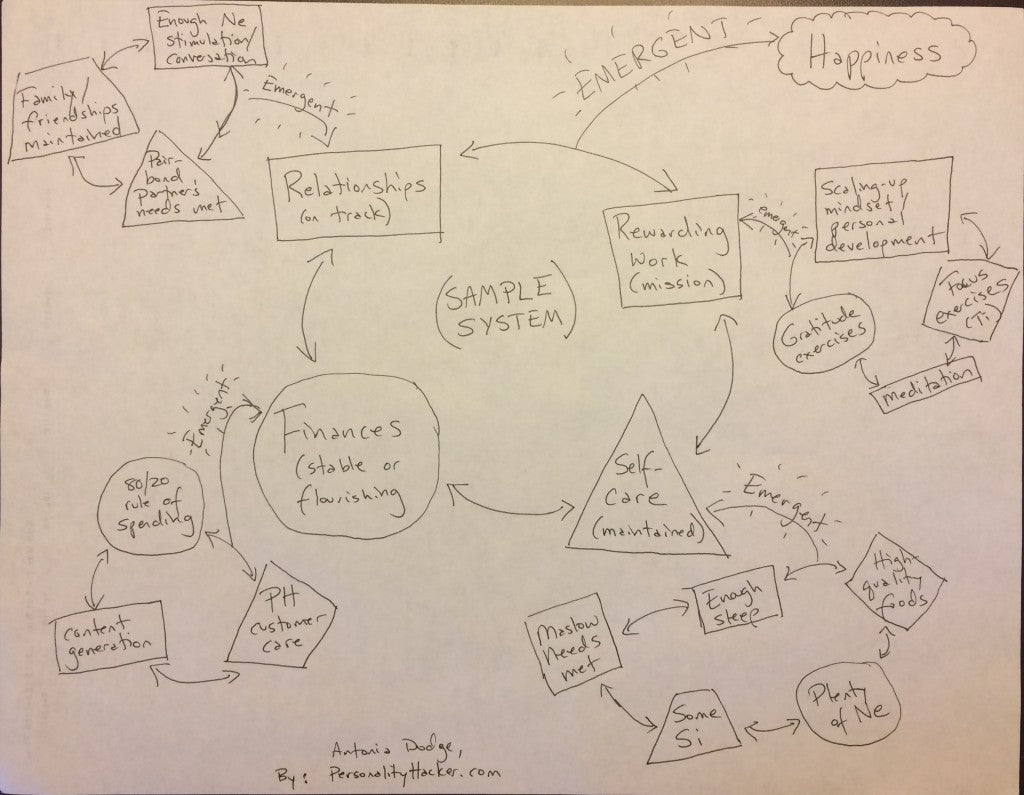Download Episode Here – right click link and select “Save Link As…”
In this episode Joel and Antonia talk about how the narratives we choose in life inform our levels of happiness and growth.
In this podcast you’ll find:
- Saccadic Masking (aka saccadic suppression) is the tendency for the brain to selectively block visual processing during eye movements so that we cannot perceive of the eyes moving or notice the gaps in visual perception.
- Brain forces us to be blind during a certain part of the day. It interprets everything that comes from our visual receptors and chooses to ignore certain details. Our eyesight is not objective reality. It goes thru many filtration processes in the eyeball itself.
- The reason this is fascinating is that we experience reality as though it is objective. “Seeing is believing.” It is more accurate to say, “Believing is seeing.” The stories and narratives that run in our minds are far more influential than we give them credit for.
- Based upon context, we see what we are expecting to see. If the context is undesirable we will frequently expect something equally undesirable, and vice versa. You fed your brain context long before you ever got to the situation you are trying to interpret. Podcast Episode 11 – What the Thinker Thinks – The Prover Proves
- What do we do about this mechanism? There are styles of beliefs that inform how we show up to the world. Podcast Episode 104 – Overcoming Limiting Beliefs
- Our narrative structure has a certain malleability. Every time you think or feel something you are making the choice to think or feel that way. This is not to say there is not a concrete reality that exists, but that we are choosing to interpret our own reality.
- Babies are effectively blind when they are born. Until their brain gets used to what faces are supposed to look like. There may be an objective world that exists but we cannot directly experience it. We can only subjectively interpret it.
- We are on autopilot most of the time. However, we do have control of the GPS unit, so we can control our trajectory and how we cast our narrative.
- When we are making choices around a narrative we have already made a thousand choices that lead up to that one choice.
- The time to shift narratives is long before the moment of necessity. When we aren’t pressured to make a choice, we need to reevaluate the etymology of our stories, narratives and paradigms, and ask ourselves if those are the narratives we want. Before we get to those big choice moments we need to take control of our minds.
- See if you can expand your narrative reach to include more territory.
5 different ways of experiencing reality:
- Systems Thinking: Every result is the inevitable emergent of an entire system that’s running. (Podcast Episode 39)
- Graves model – Vertical model of development and growth. As we develop and grow our territories expand. (Podcast Episode 22)
- Myers-Briggs Typology and the Cognitive Function Stack. (Podcast Episode 20)
- 8 circuit model (Robert Anton Wilson) How we get impressions at different phases of life then never re-evaluate. (Podcast Episode 18)
- Enneagram – how you deal with trauma and strategies you use to get what you want and heal yourself. (Podcast Episode 21)
- These are just 5 of many systems that affect who and what we are. All of these different nodes have your belief system be the inevitable emergent of those systems running. Your narratives are the only narratives you can possibly have based upon those systems.
- You may think you have chosen these beliefs and that they are within your power, but they are not. They are largely out of your power.
- The language you speak informs how you will engage with the world. culture, religion, etc. All these nodes are moving together as a system to create YOU at any given moment.
- Do we have any power over what we think? Kind of. We have more power when we acknowledge how little power we have.
- The belief system is the emergent. When the node changes the whole system changes. If you change your relationship with your Cognitive Function stack, or develop your copilot, that is going to alter that node. That change will affect all the other nodes. Your belief system will change.
- How do you go into the source code and change it?
- About a year ago we were in a social setting with some family members and Antonia said something that offended someone. Our first response is always to apologize, but what if we instead made the observation, “That is interesting that you have been chosen to be offended by that.” Or if we are the ones taking offense we can ask ourselves, “Why am I choosing to be offended right now?”
- We choose our responses. We could choose to not be offended. You get to choose how you interpret what is happening. It might take work and time. It might even change your world view. Podcast Episode 26 – Empowering Personal Rules
- You can choose happiness. You can level up and see things in a more sophisticated way.
- Sit down with a piece of paper and pencil, and create your own system diagram (pictured below). Reverse engineer how our beliefs came to be. Is the belief what you want? Is it feeding into another system?
- Re-evaluate how you see reality. Narratives are flexible.
Sample Systems Thinking Diagram:
This is a rough draft sketch showing how easy it is to identify the nodes in a system that influence the ‘inevitable result’ (aka the emergent). Notice how the nodes in the system are, themselves, emergent properties of other systems running. While a bit over simplified, it does illustrate how easy it is to draw out a rapid prototype which can then be fleshed out to a more accurate system:
To subscribe to the podcast, please use the links below:
Subscribe with iTunes
Non iTunes Link
Download The Android App
Subscribe on Soundcloud
Subscribe with Stitcher
If you like the podcast and want to help us out in return, please leave an honest rating and review on iTunes by clicking here. It will help the show and its ranking in iTunes immensely! We would be eternally grateful!
Want to learn more?
Discover Your Personal Genius
We want to hear from you. Leave your comments below…




Share:
Podcast - Episode 0104 - Overcoming Limiting Beliefs
Podcast - Episode 0106 - How Types Say "I Love You"
6 comments
I am one of those who has been reevaluating all the narratives of my life for a few years now. I am glad I came across your content because it has helped me to look at those narratives from another prospective. The world around me looks different to me now and hearing you two talk about your experiences is helping me make sense of things I have been having trouble seeing up till now. Making changes in the decades of mental programing takes time but I can see how it will end up with me having a better life in the future. I think it is awesome to hear you guys talking about the books you have read because I don’t have that ability to remember everything I have read like you guys do.
Thanks for all you do.